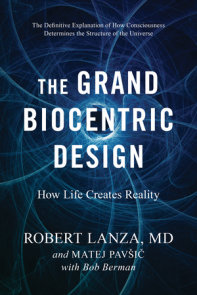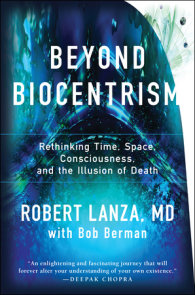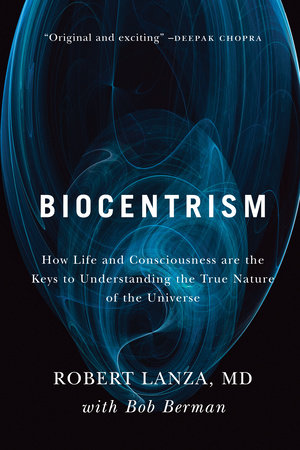

Biocentrism
By Robert Lanza and Bob Berman
By Robert Lanza and Bob Berman
By Robert Lanza and Bob Berman
By Robert Lanza and Bob Berman
Category: Philosophy | Science & Technology
Category: Philosophy | Science & Technology

-
$16.95
May 18, 2010 | ISBN 9781935251743
-
Feb 02, 2010 | ISBN 9781935251248
YOU MAY ALSO LIKE

Against Moral Responsibility
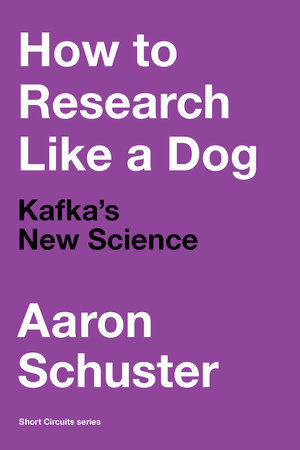
How to Research Like a Dog

Diligence
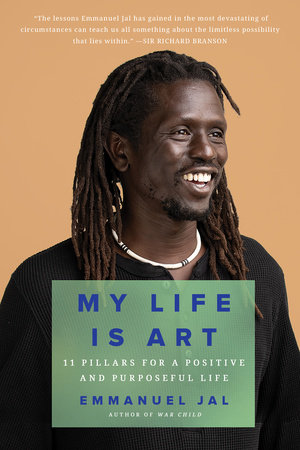
My Life Is Art
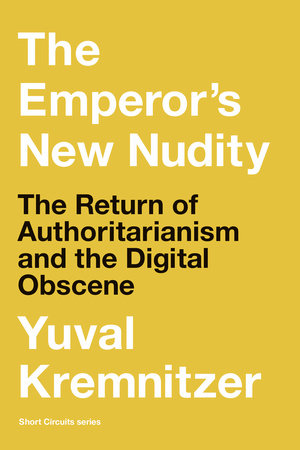
The Emperor’s New Nudity
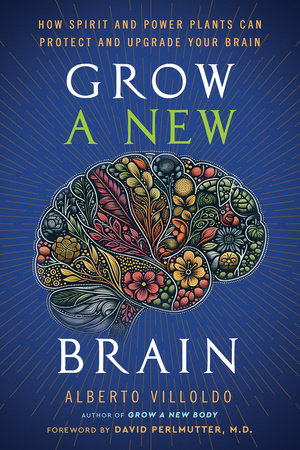
Grow a New Brain
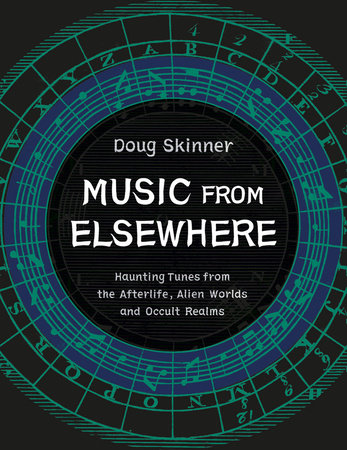
Music from Elsewhere

The Sobriety Deck

The Animal Elders Oracle
Praise
“I found the attack on physics to be pretty compelling … Lanza’s theories [are] certainly worth debate.”
— Houston Chronicle‘s Eric Berger, SciGuy blog
“What makes this book both interesting and worth the effort of reading it; is the unique perspective Lanza brings to the subject matter as a physician. … From the way [Lanza] chooses to present his arguments, it’s clear he has a solid grasp of esoteric disciplines like quantum theory, special relativity and particle physics. And what makes his presentation more compelling than other efforts I’ve encountered is his ability and willingness to weave personal experience into the thoughts and ideas presented. His style is conversational and warm which tends to pull you along through the exposition gently. And his sense of wonder and befuddlement at shop worn enigmas like the double slit experiment, Bell’s theorem, non-locality and Schrödinger’s cat is as infectious as it is delightful … I very much like what Lanza has to say in Biocentrism.”
— Midwest Book Review
Endorsements for Robert Lanza’s essay on which Biocentrism is based:
“For several days now I have read and reread your article and thought about it. Like ‘a brief history of time’ it is indeed stimulating and brings biology into the whole. Any short statement does not do justice to such a scholarly work. Almost every society of mankind has explained the mystery of our surroundings and being by invoking a god or group of gods. Scientists work to acquire objective answers from the infinity of space or the inner machinery of the atom. Lanza proposes a biocentrist theory which ascribes the answer to the observer rather than the observed. The work is a scholarly consideration of science and philosophy that brings biology into the central role in unifying the whole. The book will appeal to an audience of many different disciplines because it is a new way of looking at the old problem of our existence. Most importantly, it makes you think.”
—E. Donnall Thomas
Thomas was awarded the 1990 Nobel Prize in Physiology and Medicine. He is Professor Emeritus at the University of Washington and Director Emeritus of the Clinical Research Division at the Fred Hutchinson Cancer Research Center.
“It is genuinely an exciting piece of work. I am very familiar with some of the things you say. The idea that consciousness creates reality has quantum support, as you suggest, and also coheres with some of the things biology and neuroscience are telling us about the structures of our being. To put what you are doing in a larger context, it exhibits a dramatic new Copernican reversal. Just as we now know that the sun doesn’t really move but we do (we are the active agents), so you are suggesting that we are the entities that give meaning to the particular configuration of all possible outcomes we call reality. I think this is a great project.”
—Ronald Green
Green is the Eunice and Julian Cohen Professor for the Study of Ethics and Human Values, and Director of Dartmouth College’s Ethics Institute. Professor Green is a well-known religious studies scholar and former Chairman of the Department of Religion
“Robert Lanza, a world renowned scientist who has spanned many fields from drug delivery to stem cells to preventing animal extinction, and clearly one of the most brilliant minds of our times, has done it again. ‘A New Theory of the Universe’ takes into account all the knowledge we have gained over the last few centuries, and correlates them to our own beings, placing in perspective our biologic limitations that have impeded our understanding of greater truths surrounding our existence and the universe around us. This new theory is certain to revolutionize our concepts of the laws of nature for centuries to come.”
—Anthony Atala
Atala is an internationally recognized scientist, and the W.H. Boyce Professor, Chair, and Director of the Wake Forest Institute for Regenerative Medicine at the Wake Forest University School of Medicine.
“As an astrophysicist, I focus my attention on objects that are very large and very far away, ignoring the whole issue of consciousness as a critical part of the Universe. Reading Robert Lanza’s work is a wake-up call to all of us that even on the grandest scale we still depend on our minds to experience reality. Issues of “quantum weirdness” do have a place in the macroscopic world. Time and space do depend on perception. We can go about our daily lives and continue to study the physical Universe as if it exists as an objective reality (because the probabilities allow that degree of confidence), but we do so with a better awareness of an underlying biological component, thanks to Dr. Lanza. I cannot speak for NASA or other NASA scientists, but personally I look forward to hearing a more detailed explanation of this biocentric view of the Universe from Dr. Lanza.”
—David Thompson
Thompson is an astrophysicist at NASA’s Goddard Space Flight Center. His contributions include the building and flying of prototypes of EGRET, which was launched by the Space Shuttle Atlantis in 1991. He is currently with the Astroparticle Physics Laboratory, and has received both the Goddard Space Flight Center & NASA Group Exceptional Achievement Awards.
“Yes, it is appropriate to ask whether our perception of space and time is a consequence of our particular neurophysiology. Yes, it is appropriate to ask how it happened that the conditions worked out to be just right for life to appear somehow on earth and then to evolve from the archaea through the eukaryotes to us. … I’ll bet the book gets a good audience. And I like to see books published that challenge my own ideas and thoughts in ways that make me think, but not ones that simply throw dogma at me. The essay is definitely of the former kind.”
—R. Stephen Berry
Berry is James Franck Distinguished Service Professor Emeritus, Department of Chemistry, University of Chicago. Professor Berry is a member (and recent Home Secretary) of the prestigious National Academy of Sciences. He was also former Vice President of the American Academy of Arts and Sciences and MacArthur Prize “Genius” Fellow.
“Science has a token of freedom that motivates scientists to study all logical possibilities that may explain the world. Robert Lanza has come up with an innovative approach to investigate reality from the viewpoint of biology. His article demands an answer to the question of whether scientists have exhausted all possible tools for studying nature. Can science bring biology into grand unified theory? A solution is suggested that involves a new concept, biocentrism. Lanza goes beyond the individual human attribute calling for interconnectedness among all living creatures forming the fundamental basis for understanding reality. A book that expands upon this unique approach is warranted, not only to alert society, but to call on it to test this novel new hypothesis.”
—Gunther Kletetschka
Kletetschka is a geophysicist at NASA’s Goddard Space Flight Center. He is also a Research Professor of Physics at Catholic University of America and leading scientist working on the James Web Space Telescope.
“It’s a masterpiece—truly a magnificent essay. Bob Lanza is to be congratulated for a fresh and highly erudite look at the question of how perception and consciousness shape reality and common experience. His monograph combines a deep understanding and broad insight into 20th century physics and modern biological science; in so doing, he forces a reappraisal of this hoary epistemological dilemma. Not all will agree with the proposition he advances, but most will find his writing eminently readable and his arguments both convincing and challenging. Bravo.”
—Michael Lysaght
Lysaght is Professor of Medical Science and Engineering at Brown University and Director of Brown’s Center for Biomedical Engineering.
Table Of Contents
Introduction 1
1. Muddy Universe 3
2. In the Beginning There Was . . . What? 11
3. The Sound of a Falling Tree 19
4. Lights and Action! 25
5. Where Is the Universe? 33
6. Bubbles in Time 41
7. When Tomorrow Comes Before Yesterday 47
8. The Most Amazing Experiment 61
9. Goldilocks’s Universe 83
10. No Time to Lose 95
11. Space Out 111
12. The Man Behind the Curtain 129
13. Windmills of the Mind 135
14. A Fall in Paradise 143
15. Building Blocks of Creation 147
16. What Is This Place? 153
17. Sci-Fi Gets Real 163
18. Mystery of Consciousness 169
19. Death and Eternity 185
20. Where Do We Go from Here? 195
Excerpt from The Grand Biocentric Design: Questions and Criticisms 198
Index 208
About the Authors 211
21 Books You’ve Been Meaning to Read
Just for joining you’ll get personalized recommendations on your dashboard daily and features only for members.
Find Out More Join Now Sign In







